| Construction Rating: | starstarstarstarstar_border |
| Flight Rating: | starstarstarstarstar_border |
| Overall Rating: | starstarstarstarstar_border |
| Published: | 2010-05-16 |
| Diameter: | 4.88 inches |
| Length: | 8.50 inches |
| Manufacturer: | Odd'l Rockets  |
| Skill Level: | 3 |
| Style: | Odd-Roc, Pyramid |
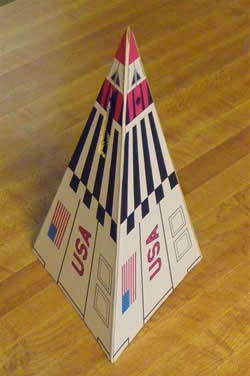
(Contributed - by Dick Stafford - 05/16/10)
Brief:
The Wedgie is a tetrahedron (3-sided pyramid) that flies on 18mm motors and recovers via a
rear-eject streamer. I want to thank Chris for letting me test out this cool oddroc kit. Mine is s/n #2!
Construction:
The Wedgie comes professionally packaged in a plastic bag with the cover of the
instructions visible. The small parts were separately bagged. The body is formed from 6 pieces of laser-cut balsa. Its
motor mount includes a two-part motor tube, two laser cut centering-triangles, a motor block, a cardboard plug, and two
'standard' centering rings (BT-20 to BT-50 sized). Recovery parts include an elastic shock cord, swivel, and crepe
streamer. Miscellaneous parts include a 1/8" launch lug and clay nose weight.
The instructions are detailed and well illustrated.
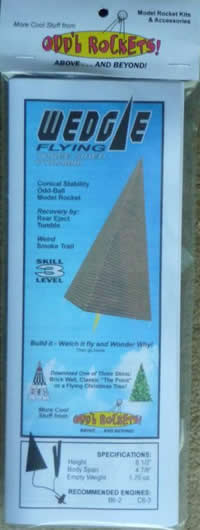 Don't let its 'odd' nature fool you. This is a builders kit and I recommend you actually read the instructions
thoroughly before beginning. It is rated as skill level 3, and I concur with this rating.
Don't let its 'odd' nature fool you. This is a builders kit and I recommend you actually read the instructions
thoroughly before beginning. It is rated as skill level 3, and I concur with this rating.
You start by building the two-part motor mount. The upper part will eventually be attached to the body while the lower section is free to eject and deploy the streamer. Construction is straightforward and all the parts fit perfectly. The key points for the mount are making sure the centering-triangles are installed perpendicular to the motor tube(s) and at the prescribed locations. An attached photo shows the mount being constructed with fillets drying.
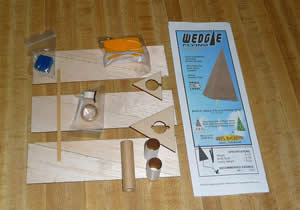
The body assembly is a bit more difficult. Here, you begin by gluing the 2 halves of each of the three faces
together. It appears this was to alternate the grain directions and add strength. Next you sand the joint flat. Easy so
far.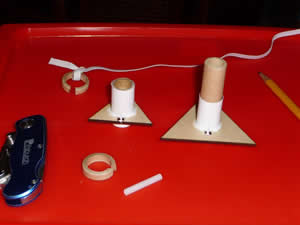
Now for the hard(er) part - beveling the edges to allow them to fit well. A sanding guide is provided, but this step strained my clumsy building skills. I cracked one as I was sanding and would recommend doing the beveling before joining the pieces. Easily fixed.
The faces are supposed to be joined with CA. Instead, I used Titebond molding and trim glue. This is thick and
tacky and let me put the three pieces together rather easily. I taped the corners and top while the glue set. Later, I
reinforced the joints with thin CA. There is a template to locate and cut the hole for the launch rod. If I were to do
it again, I'd also cut this before the faces are joined.
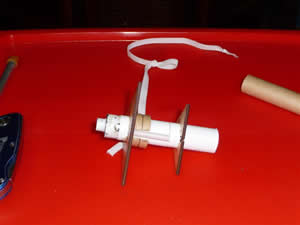
Next, you install the clay nose weight and install the upper motor mount. You have to make sure the clay doesn't interfere with the launch rod. I also had to extend the opening a tad further down the body so the launch rod would clear.
The shock cord is attached to the inside base with a strip of balsa that is provided. (see photo) You are instructed to notch the middle so the elastic cord will fit under it. This was challenging since the strip is only about 1/16" thick to start.
Finishing:
Odd'l provides several skins that you can download, including a blank one. I finally decided
on 'The 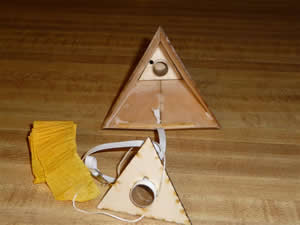 Point', which is themed like the classic cone rocket kit of the same name. I printed three copies of the
template and sealed them with a clear coat before starting. The instructions say to use spray glue. I dread using the
stuff, but it is about the only choice for plain paper like this. I was pleasantly surprised that the skins stayed on
the rocket and not the builder.
Point', which is themed like the classic cone rocket kit of the same name. I printed three copies of the
template and sealed them with a clear coat before starting. The instructions say to use spray glue. I dread using the
stuff, but it is about the only choice for plain paper like this. I was pleasantly surprised that the skins stayed on
the rocket and not the builder.
Overall, this was a fun and slightly challenging build. I'm happy that Chris's parts were so precise. Everything fit as advertised and the skins are nice. I'd suggest tweaking the steps to bevel-before-joining and to cut the launch rod hole before assembling the body.
Construction Rating: 4 out of 5
Flight:
Prep is conceptually simple - fold and pack streamer, install motor by taping it to the lower
motor tube, install igniter, and launch. I found that packing the streamer and getting the motor to stay in place took
a tad of fiddling. My main concern prior to launch was the shock cord attachment. Will it hold? Will the exposed
elastic get burned by hot gasses trapped in the base?
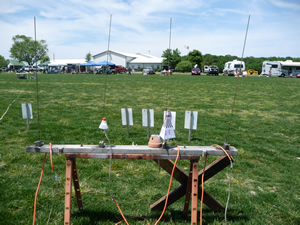 Well I
flew the Wedgie twice. I used Quest Q2G2 igniters, which are nice because the long leads make it easier to connect the
clips.
Well I
flew the Wedgie twice. I used Quest Q2G2 igniters, which are nice because the long leads make it easier to connect the
clips.
It was quite windy for the flight on a Quest 'long burn' C6-3. It weather cocked a lot but still attained a nice altitude. Ejection occurred as planned and it recovered well. The only damage, if you will, was the tip of one of the skins peeled back as it poked into the sod. This was easily fixed with some cellophane tape. In fact, I recommend you add some preemptively.
I flew it again on a Quest B6-4. The winds had died down a bit and the boost was a lot straighter. Recovery was a bit late but was still in plenty of time. This time, the crepe streamer was singed a bit. It turns out that I didn't use a square of wadding as directed in the instructions (it's even underlined for emphasis). D'OH. I guess that's what happens when you read, build, put on shelf for a couple of weeks, and then rush to the launch.
Flight Rating: 4 out of 5
Summary:
I love oddrocs and I like the way this one flies. Its prep is easier than a 3/4FNC in some ways
(no wadding) and harder in others (more dexterity required). The only down side I see is that the streamer may need to
be replaced after several flights (or maybe not if you follow directions).
Overall Rating: 4 out of 5
Other Reviews
- Odd'l Rockets Wedgie By Chan Stevens (December 17, 2011)
A flying pyramid odd-roc with plenty of skin/decorating options... Components I'll take the easy road and just post a concurring/second opinion to Dick's thorough review. I purchased my kit in the fall of 2011, and the components have not changed. /h2 This is definitely not your simple 3-fin model, so reading the fairly good instructions is a must. I would ...
 |
 |
Flights
 |
 |
D.D. (June 4, 2010)
C.M. (June 10, 2010)
D.S. (June 11, 2010)
Sponsored Ads
 |
 |












C.,.M.,. (June 3, 2010)